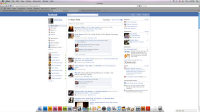
This weekend, I went to Montreal to visit some of my boyfriends family. I had never been there before, so this was all very new to me. As soon as we crossed the border, something was different. Yes, I know what you're thinking, it's because the land is suddenly flat, and everything is written in two languages. But I also noticed something else,- their
advertising.
It wasn't something that was done through fear, it was something that was done though heavy extensive advertising, it was something that was genuine. Canadians were genuinely happy to be in their country, and to be consumers. Their
advertisements didn't come off as something that would make me a loser if I didn't have this product, they came off as something to inform me, just letting me know that the option is out there, but if i chose something different it would be okay. This was new to me, because
I'm used to sitting down and watching TV where every commercial is telling me how I can become a better version of myself. In Canada, I can't speak for the commercials in french, but the commercials in
English were nothing of the sort. These people were proud to be Canadian. They were happy to be
advertising for their country.
My
Triune Brain was loving every moment of this. My
Reptilian Brain was as ease, my
Limbic Brain was
processing emotions of happiness and not fear, and my
Neocortex was
processing these message with real consideration because they weren't yelling at me to have something.
I noticed things like the
Personal Shift, because I didn't feel that these ads were directed right to me, but rather just those people around my in general who fit into the marketing segment, and I liked this better then thinking they were gunning for me.
I paid attention to
Production Techniques, because I thought that the things they did use for their advertising were unique and creative. They didn't use things that fooled me, but rather it seemed like they used creativity to grab my attention. I did question
Ownership, because I do fully understand that these are all things that are getting my attention, these companies are still getting what they want.

As for
Persuasive Techniques, I noticed a very wide variety of things. For
example,
symbols of the Canadian maple leaf,
bandwagon,
plain folks,
group dynamics, and
strength were a lot of what I saw. Granted, this could have a lot to do with the fact that they are currently hosting the
Olympics, and are very proud at the moment. But overall I got the message that
Canadians were proud people, who really loved their country. I also saw a lot of use of
humor and
warm fuzzies, but something I didn't see a lot of, was
fear. This technique wasn't something that I saw being used at all, because they realize that to scare someone into buying your product is not way to establish yourself as a company in society.
Finally, someone get the message.







